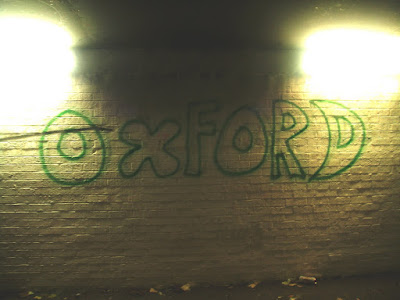One answer is that to the extent that others identify with this subjective view, there’s value. And in this search for identification and difference, we see a parallel in a football crowd. At any moment one finds people of different backgrounds, different views, different values, and yet what attracts so many people to follow a football club is a sense of unity. Vociferous disagreements are held about the talents of a particular player, the merits of a particular manager, the wisdom of a particular tactic, and yet, for the most part, we can be as one on the terrace. We are the Left Side/We are the Right side: but, We are The London Road.
 We Are Oxford United: This title was intended at once to be a claim of possession, but also a nod to this sense of universality. We wanted anyone who follows Oxford United to look at the things we present here, and recognise in them something they know, something they are a part of. Where can this universality come from?
We Are Oxford United: This title was intended at once to be a claim of possession, but also a nod to this sense of universality. We wanted anyone who follows Oxford United to look at the things we present here, and recognise in them something they know, something they are a part of. Where can this universality come from?As we talked about in our last post, one important factor is the context in which these games of football we watch take place in. Without supporters, without a league, without desire, you just have 22 men moving a ball round a pitch.
But perhaps the most important piece of context is the past. This is something we saw in what Oxblogger was doing in his favourite posts of ours, the ones we found ourselves identifying with most strongly (such as this, this, this, but especially, this). For the experience of the Oxford United supporter watching the team, as I would guess for all supporters, the past is always present. The players, team, manager, ground, club: they all change, but these are only so many pieces of tracing paper layered over whatever it is that lies at the bottom of this all. It’s this that we glimpse on occasion through these pieces of paper: it portrays a new scene, but visible through it is something we recognise, something we find all-too familiar.
 And in the end, that’s what we tried to do last season: to find whatever it is that lies at the bottom of all this. Or not to find it, but to try and allow us, and anyone following this, to glimpse it. Because we’ve become started to realise that what we want to convey can’t be looked at directly, and it can’t be written down. It’s there at the back of your mind: it’s there in the corner of your eye. That’s how we’d like you to look at this blog: subconsciously, with the corner of your eye. If you find that you can see what we’re getting at, then we’ll have managed to say something about Oxford United.
And in the end, that’s what we tried to do last season: to find whatever it is that lies at the bottom of all this. Or not to find it, but to try and allow us, and anyone following this, to glimpse it. Because we’ve become started to realise that what we want to convey can’t be looked at directly, and it can’t be written down. It’s there at the back of your mind: it’s there in the corner of your eye. That’s how we’d like you to look at this blog: subconsciously, with the corner of your eye. If you find that you can see what we’re getting at, then we’ll have managed to say something about Oxford United.

 And we can talk about the context in which this action takes place: the surroundings, the supporters, hope, anxiety, and despair. These are subjects can be hard to talk about in a way that feels adequate, and the retreat to stock footballing phrases is all too easy. When so many games are ‘must wins’, when players and supporters are always ‘desperate’ for success, when we’re ‘gutted’ once again following defeat, these words become mundane as we move further and further away from any real awareness of what it was we felt, and why it was we felt so strongly.
And we can talk about the context in which this action takes place: the surroundings, the supporters, hope, anxiety, and despair. These are subjects can be hard to talk about in a way that feels adequate, and the retreat to stock footballing phrases is all too easy. When so many games are ‘must wins’, when players and supporters are always ‘desperate’ for success, when we’re ‘gutted’ once again following defeat, these words become mundane as we move further and further away from any real awareness of what it was we felt, and why it was we felt so strongly.


